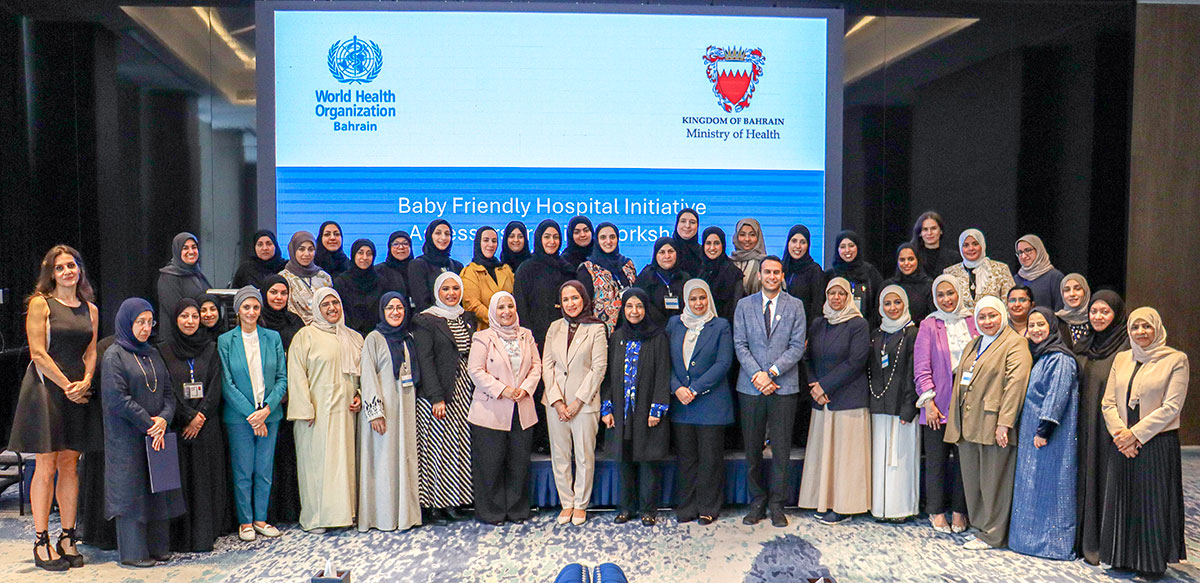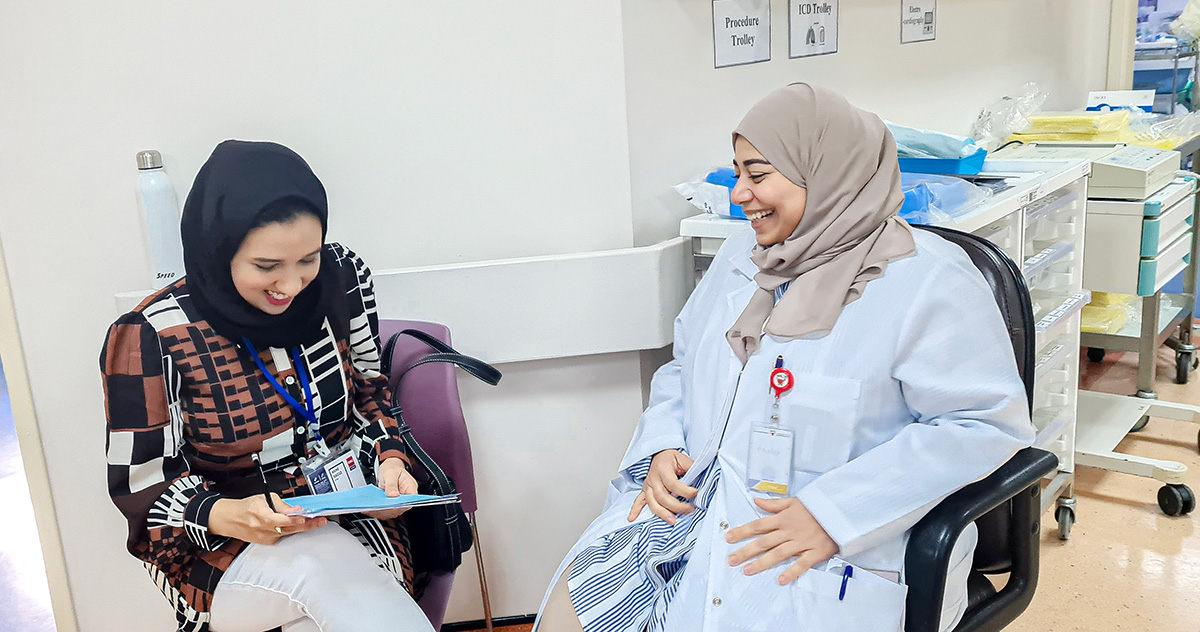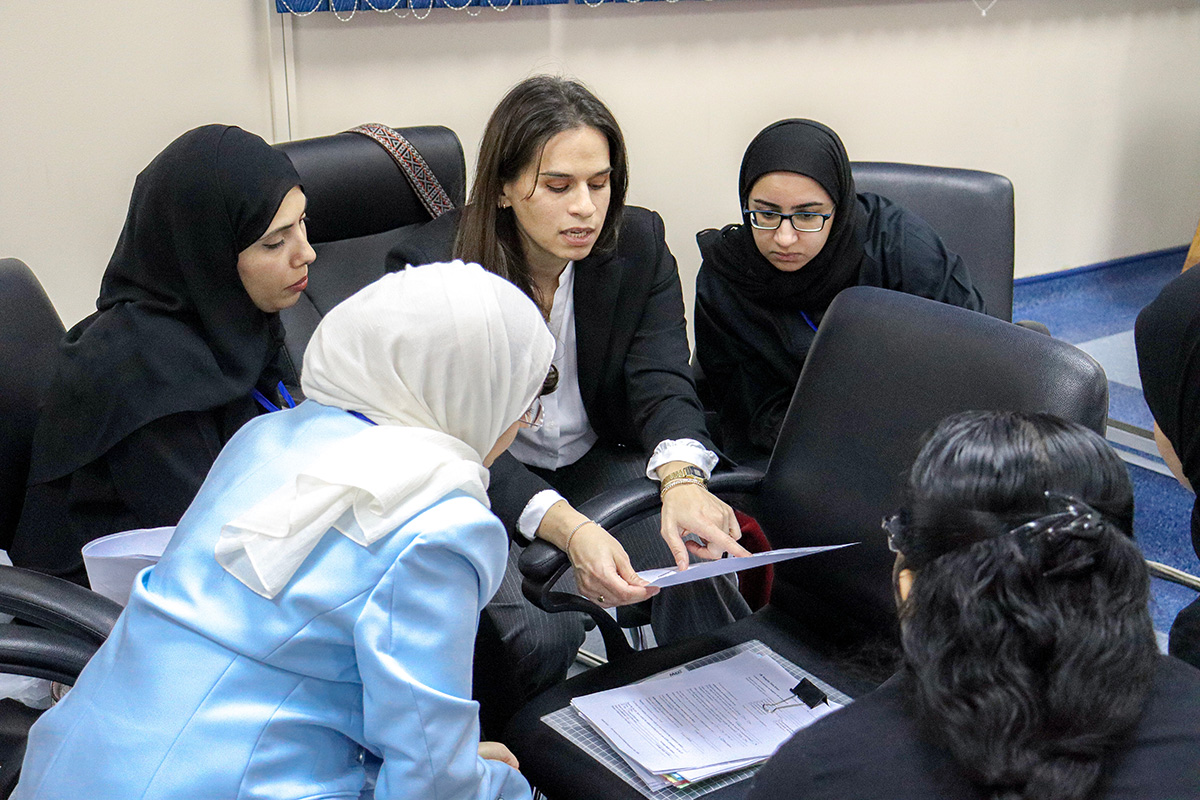 Assistant Undersecretary for Public Health Dr Samya Bahram, WHO Representative in Bahrain Dr Tasnim Atatrah and participants during the closing ceremony of the Baby-friendly Hospital Initiative Assessor Training Workshop. Photo credit: WHO / WHO Bahrain
Assistant Undersecretary for Public Health Dr Samya Bahram, WHO Representative in Bahrain Dr Tasnim Atatrah and participants during the closing ceremony of the Baby-friendly Hospital Initiative Assessor Training Workshop. Photo credit: WHO / WHO Bahrain
3 December 2024, Manama, Bahrain – Between 24 and 28 November, WHO, in collaboration with the Ministry of Health and Government Hospitals, conducted a 5-day training workshop on the Baby-friendly Hospital Initiative (BFHI).
Breastfeeding has many health benefits for mothers and infants, and the first few days following delivery are a critical window for providing mothers with the support they need to breastfeed successfully.
 As part of the training exercises, participants interview hospital staff on the Ten Steps to Successful Breastfeeding. Photo credit: WHO / WHO BahrainBreast milk contains all the nutrients an infant needs in the first 6 months of life. WHO recommends exclusive breastfeeding for the first 6 months, with continued breastfeeding to 2 years of age and beyond.
As part of the training exercises, participants interview hospital staff on the Ten Steps to Successful Breastfeeding. Photo credit: WHO / WHO BahrainBreast milk contains all the nutrients an infant needs in the first 6 months of life. WHO recommends exclusive breastfeeding for the first 6 months, with continued breastfeeding to 2 years of age and beyond.
Launched in 1991 by WHO and the United Nations Children’s Fund (UNICEF), BFHI is a global effort to implement practices that protect, promote and support breastfeeding. The initiative is based on integrating the Ten Steps to Successful Breastfeeding across all maternity care facilities.
The main goal of the training workshop was to build national capacity in Bahrain to develop a pool of assessors using WHO/UNICEF guidelines and training tools, and to increase knowledge of BFHI across the country.
 Participants review assessment tools and plan practical exercises. Photo credit: WHO / WHO BahrainOver 40 participants participated in the training, including physicians, midwives, nurses and allied health professionals from the Ministry of Health, primary health care centres, public and private hospitals and the WHO Country Office in Bahrain.
Participants review assessment tools and plan practical exercises. Photo credit: WHO / WHO BahrainOver 40 participants participated in the training, including physicians, midwives, nurses and allied health professionals from the Ministry of Health, primary health care centres, public and private hospitals and the WHO Country Office in Bahrain.
Promoting exclusive breastfeeding will help achieve breastfeeding-related SDG indicators and WHO global targets to reduce stunting by 40%, increase exclusive breastfeeding by 50%, reduce wasting to less than 5%, reduce low birth weight by 30%, halt any increase in childhood obesity and reduce anaemia among women of reproductive age by 50%.
Bahrain has prioritized increasing breastfeeding rates. Successful BFHI implementation will see the programme fully integrated into the health care system and ensure that all facilities in the country implement the Ten Steps, supported by policies that increase maternity protection and regulate the marketing of breast-milk substitutes.
Related links:
Baby-friendly Hospital Initiative
Implementation of the Baby-friendly Hospital Initiative


